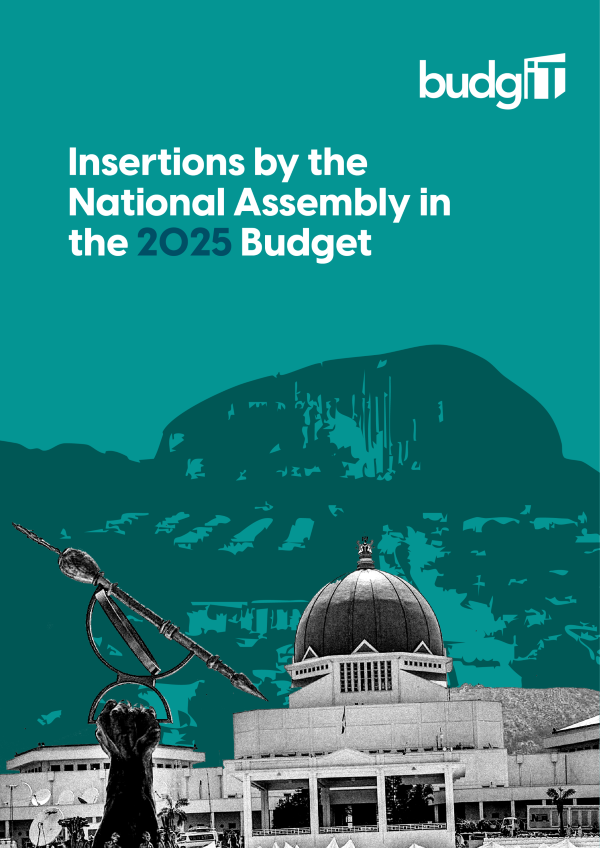BudgIT and Budget of Distortion: Inside Nigeria’s N6.93 Trillion NASS Insertions Scandal

The 2025 national budget, touted by the Tinubu administration as a blueprint for economic recovery, has once again become the epicentre of a deepening scandal. BudgIT, Nigeria’s foremost civic-tech organisation tracking public finance, has uncovered a staggering 11,122 projects valued at N6.93 trillion dubiously inserted into the national budget by the National Assembly, raising urgent questions about the transparency, credibility, and integrity of Nigeria’s fiscal governance.
This N6.93 trillion represents a mind-boggling 12.5% of the total N54.99 trillion budget signed into law by President Bola Ahmed Tinubu in February 2025—a figure that already overshot the originally proposed N49.7 trillion by more than N5 trillion. While the Executive claimed the upward revision was driven by new revenue from FIRS, Customs, and other agencies, what has now emerged is a parallel fiscal operation—conducted in the shadows of democracy.
Anatomy of the Budget Insertions
According to BudgIT’s forensic 18-page report, 238 “mega projects” valued above N5 billion each—totaling N2.29 trillion—were inserted with no accompanying justification or strategic context. Even more startling is the pattern of insertions:
- 984 projects worth N1.71 trillion;
- 1,119 projects ranging from N500 million to N1 billion (totalling N641.38 billion);
- Over 4,371 projects worth N1.72 trillion dumped into the Ministry of Agriculture’s budget, ballooning its capital vote from N242.5 billion to a staggering N1.95 trillion;
- Inflated allocations also hit the Ministry of Science and Technology (N994.98bn) and Budget & Economic Planning (N1.1tn)—far exceeding their developmental mandate.
This tsunami of opaque spending cuts across sectors—from streetlight projects (N393.29 billion) to ICT “initiatives” (N505.79 billion), boreholes (N114.53 billion), and an eyebrow-raising N6.74 billion for “traditional rulers’ empowerment”.
Fiscal Sleight of Hand or National Betrayal?
The figures tell a tale not just of padding—but of deliberate fiscal sabotage.
The Nigerian Constitution is unambiguous: the Executive initiates the budget; the Legislature reviews and passes it. Yet, what has unfolded is a systemic hijack of that process, with lawmakers inserting thousands of pet projects—many of which fall outside the legal mandate of the Ministries, Departments, and Agencies (MDAs) tasked with implementing them.
For instance, the National Centre for Agricultural Mechanisation in Ilorin was mysteriously assigned over N750 million for scholarships and health insurance schemes in Bayelsa, hundreds of kilometres outside its jurisdiction and expertise.
Business Implications: Misallocation, Lost Opportunities, and Investor Risk
From a financial analyst’s perspective of the BudgIT revelations, this situation represents more than a governance failure—it is a budgetary distortion with significant macroeconomic consequences:
- Capital misallocation undermines fiscal efficiency and national competitiveness;
- Opaque expenditure weakens investor confidence in Nigeria’s policy and budget discipline;
- Distorted sectoral priorities make meaningful economic forecasting and business planning difficult;
- Public debt pressure will rise as the government borrows to fund non-priority, poorly scoped projects.
For private sector players, particularly in infrastructure, agriculture, ICT, and MSME financing, this budget anomaly signals an urgent need for risk-adjusted engagement with MDAs, and greater due diligence on the political economy driving project pipelines.
Institutional Reactions: Denial, Outrage, and a Familiar Playbook
Predictably, the Senate has dismissed the BudgIT revelations as “the handiwork of dark angels of falsehood,” while insisting that the budget was passed strictly based on executive submissions.
But history belies this defence.
Since 1999, budget padding has remained a recurring nightmare—undermining Nigeria’s democracy and development trajectory:
- 2000: President Obasanjo rejected the budget over unauthorized N2bn insertions.
- 2011: Jonathan rejected the budget due to a N112bn hike by lawmakers.
- 2016: The infamous Abdulmumin Jibrin exposé alleged N40bn worth of fraudulent constituency projects.
- 2024: Senator Abdul Ningi was suspended after claiming N3.7 trillion was “missing” from the national budget.
What BudgIT now exposes is not an anomaly—it is a continuation of a systemic practice rooted in patronage politics, legislative overreach, and a compromised budget architecture.
Experts Speak: Systemic Collapse Looms
Renowned economists and political analysts have not minced words.
- Prof. Ndubisi Nwokoma warned that Nigeria’s budgetary process has become “a culture of corruption,” enabled by weak institutions and the failure of enforcement. “It’s unsustainable. The system will collapse,” he said.
- Dr. Aminu Hayatu of Bayero University decried the legislature’s encroachment into executive functions as “a constitutional betrayal.”
- Prof. Abubakar Kari described the insertions as “indefensible, irresponsible and unacceptable,” urging a legal challenge to define the true boundaries of legislative power.
Civil Society: Nigerians Must Demand Accountability
For civil society leaders like Auwal Musa Rafsanjani of CISLAC and Comrade Toyin Raheem of CACOBAG, the scandal reflects a broader failure of citizenship and civic engagement.
“Nigerians are no longer shocked,” Rafsanjani said. “Lawmakers are now budget merchants. They allocate, supervise, and profit—all under the guise of representation.”
Both activists called for radical reform: independent oversight of constituency projects, transparent procurement, citizen monitoring, and real-time budget tracking platforms.
Outlook: What Must Be Done
To restore fiscal credibility and economic discipline, BRANDECONOMY recommends:
- A legal audit by the courts to define the constitutional limits of National Assembly powers on budget insertions;
- A Presidential Executive Order establishing strict procedures for constituency projects—including needs assessments, cost benchmarking, and independent monitoring;
- Full digitisation and real-time publication of all project implementation status via the Budget Office and OpenTreasury portals;
- Enhanced role for anti-graft agencies (ICPC, EFCC, FRC) to treat padding and dubious insertions as prosecutable economic crimes;
- Public accountability dashboards by MDAs, powered by civic-tech partners like BudgIT, to enable citizens and journalists track projects and contractors.
Final Word: The Price of Silence
The 2025 Budget of “Restoration” may have begun as a promise to rebuild prosperity, but without bold executive action, judicial clarity, and citizen vigilance, it risks becoming a Budget of Regression—where fiscal distortions deepen poverty, infrastructure collapses, and trust in governance erodes.
In the words of one analyst: “When lawmakers become project merchants and budgets become loot sheets, development dies.”
For now, N6.93 trillion hangs as a question mark over Nigeria’s future.
BRANDECONOMY will continue to follow the money.
#FollowTheMoney | #BudgetOfDistortion | #NASSInsertions | #AccountabilityNow












